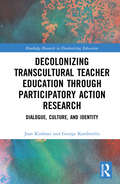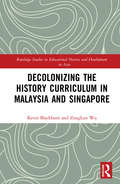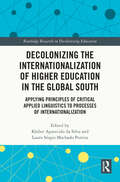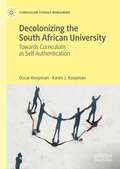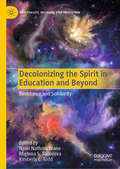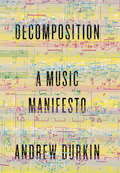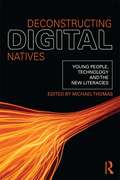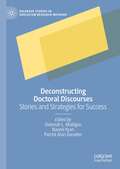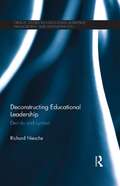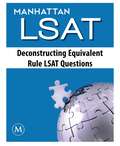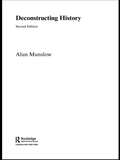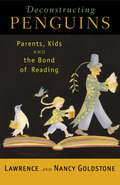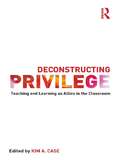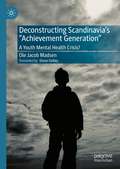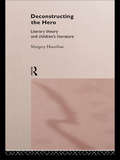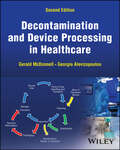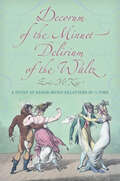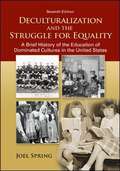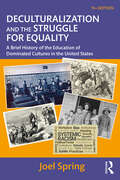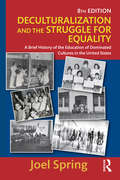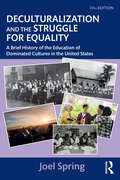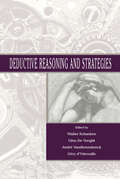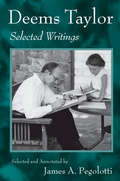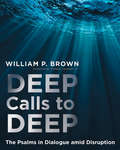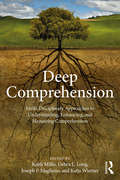- Table View
- List View
Decolonizing Transcultural Teacher Education through Participatory Action Research: Dialogue, Culture, and Identity (Routledge Research in Decolonizing Education)
by George Kamberelis Jean KirshnerThis volume describes a Participatory Action Research (PAR) project involving educators from Belize and the U.S. to illustrate the critical role of shared dialogue in transnational teacher education. First identifying issues which inhibited the success of formerly didactic training delivered to Belizean teachers by U.S. educators, this volume documents the transformational impact of a shift to collaborative training approaches and uses first-person accounts from Belizean and U.S. stakeholders to illustrate their successes. Chapters powerfully illustrate that by engaging in Freirean-like dialogue and building relationships based on a mutual understanding of the cultural and historical context, as well as the identity of educators involved, partners are better able to engage in effective transnational pedagogical collaboration. Particular attention is paid to the importance of acknowledging the post-colonial setting and unique positionality of teachers in Belize. This text will benefit researchers, academics, and educators with an interest in action research and teacher research, multicultural education, and continued professional development in particular. Those interested in teacher training, education research, and international and comparative education will also benefit from this book.
Decolonizing the History Curriculum in Malaysia and Singapore (Routledge Studies in Educational History and Development in Asia)
by Kevin Blackburn ZongLun WuDecolonizing the History Curriculum in Malaysia and Singapore is a unique study in the history of education because it examines decolonization in terms of how it changed the subject of history in the school curriculum of two colonized countries – Malaysia and Singapore. Blackburn and Wu’s book analyzes the transition of the subject of history from colonial education to postcolonial education, from the history syllabus upholding the colonial order to the period after independence when the history syllabus became a tool for nation-building. Malaysia and Singapore are excellent case studies of this process because they once shared a common imperial curriculum in the English language schools that was gradually ‘decolonized’ to form the basis of the early history syllabuses of the new nation-states (they were briefly one nation-state in the early to mid-1960s). The colonial English language history syllabus was ‘decolonized’ into a national curriculum that was translated for the Chinese, Malay, and Tamil schools of Malaysia and Singapore. By analyzing the causes and consequences of the dramatic changes made to the teaching of history in the schools of Malaya and Singapore as Britain ended her empire in Southeast Asia, Blackburn and Wu offer fascinating insights into educational reform, the effects of decolonization on curricula, and the history of Malaysian and Singaporean education.
Decolonizing the Internationalization of Higher Education in the Global South: Applying Principles of Critical Applied Linguistics to Processes of Internationalization (Routledge Research in Decolonizing Education)
by Kleber Aparecido da Silva Lauro Sérgio Machado PereiraThis book reconceives the internationalization of higher education from the perspective of Global South researchers, empowering and giving visibility to this discourse. Challenging the first assumptions of internationalization of higher education (IHE) as something overwhelmingly positive due to the way it directly impacts the university activities and their world rankings, it instead takes a critical perspective, acknowledging that this process is associated with a neoliberal and colonial orientation that focuses on the maintenance of historically sustained hierarchy, oppressive relations that stimulate the production of knowledge, and education as a commodity and not as a factor of social transformation. As such, it challenges recent trends toward an increase in internationalization strategies within higher education that privilege Global North outgoing mobilities and research collaborations to sustain the position of the educational institutions in the international rankings. From this locus, IHE is seen not only to evolve in the fields of teaching, research, and service of an educational institution but also to boost the world’s social development. The book thus illustrates how IHE should be guided by Critical Applied Linguistics (CAL) and Global South’s principles: applied linguistics, praxis, critical thinking, micro and macro relations, critical social inquiry, critical theory, problematizing givens, self-reflexivity, preferred futures, and heterosis. Comprising chapters that discuss academic, political, and administrative issues arising specifically from the internationalization process of Global South higher education institutions, as well as themes such as critical language education and language policies, it will appeal to faculty, researchers, and scholars with interests in higher education, international and comparative education, and the decolonization of education.
Decolonizing the South African University: Towards Curriculum as Self Authentication (Curriculum Studies Worldwide)
by Oscar Koopman Karen J. KoopmanThis book offers an important contribution to the field of curriculum studies and higher education by examining the impacts of colonialism and neoliberalism in the South African education system and addressing ways to decolonise curriculum and teaching. Drawing on Pinar's work in curricular theory, the authors call for integrating self-reflective curriculum development into the national curriculum process to promote indigenous education and knowledge.
Decolonizing the Spirit in Education and Beyond: Resistance and Solidarity (Spirituality, Religion, and Education)
by Njoki Nathani Wane Kimberly L. Todd Miglena S. TodorovaThis multidisciplinary collection probes ways in which emerging and established scholars perceive and theorize decolonization and resistance in their own fields of work, from education to political and social studies, to psychology, medicine, and beyond. In this time of renewed global spiritual awakening, indigenous communities are revisiting ways of knowing and evoking theories of resistance informed by communal theories of solidarity. Using an intersectional lens, chapter authors present or imagine modes of solidarity, resistance, and political action that subvert colonial and neocolonial formations. Placing emphasis on the importance of theorizing the spirit, a discourse that is deeply embedded in our unique cultures and ancestries, this book is able to capture and better understand these moments and processes of spiritual emergence/re-emergence.
Decomposition
by Andrew DurkinDecomposition is a bracing, revisionary, and provocative inquiry into music--from Beethoven to Duke Ellington, from Conlon Nancarrow to Evelyn Glennie--as a personal and cultural experience: how it is composed, how it is idiosyncratically perceived by critics and reviewers, and why we listen to it the way we do. Andrew Durkin, best known as the leader of the West Coast-based Industrial Jazz Group, is singular for his insistence on asking tough questions about the complexity of our presumptions about music and about listening, especially in the digital age. In this winning and lucid study he explodes the age-old concept of musical composition as the work of individual genius, arguing instead that in both its composition and reception music is fundamentally a collaborative enterprise that comes into being only through mediation. Drawing on a rich variety of examples--Big Jay McNeely's "Deacon's Hop," Biz Markie's "Alone Again," George Antheil's Ballet Mécanique, Frank Zappa's "While You Were Art," and Pauline Oliveros's "Tuning Meditation," to name only a few--Durkin makes clear that our appreciation of any piece of music is always informed by neuroscientific, psychological, technological, and cultural factors. How we listen to music, he maintains, might have as much power to change it as music might have to change how we listen.From the Hardcover edition.
Deconstructing Digital Natives: Young People, Technology, and the New Literacies
by Michael ThomasThere have been many attempts to define the generation of students who emerged with the Web and new digital technologies in the early 1990s. The term "digital native" refers to the generation born after 1980, which has grown up in a world where digital technologies and the internet are a normal part of everyday life. Young people belonging to this generation are therefore supposed to be "native" to the digital lifestyle, always connected to the internet and comfortable with a range of cutting-edge technologies. Deconstructing Digital Natives offers the most balanced, research-based view of this group to date. Existing studies of digital natives lack application to specific disciplines or conditions, ignoring the differences of educational fields and gender. How, and how much, are learners changing in the digital age? How can a more pluralistic understanding of these learners be developed? Contributors to this volume produce an international overview of developments in digital literacy among today’s young learners, offering innovative ways to steer a productive path between traditional narratives that offer only complete acceptance or total dismissal of digital natives.
Deconstructing Doctoral Discourses: Stories and Strategies for Success (Palgrave Studies in Education Research Methods)
by Patrick Alan Danaher Deborah L. Mulligan Naomi RyanThis book identifies and challenges assumptions about the doctorate and the discourses associated with it. The editors and contributors subvert and transform the de facto assumptions that frame the ways in which 'the doctorate' is spoken and written, and thus underpin approaches to planning, conducting and evaluating doctoral research. Giving voice to doctoral students and supervisors, the book opens a pathway for their own stories: why students entered doctoral study, the understandings and experiences they gleaned from it, and the implications for their own character. The book questions what kinds of discourses help to construct contemporary doctoral research, and how these might be de- and reconstructed, and asks what doctoral study might look like in the future. Academics, students and practitioners alike will find an avenue into rigorous research design from reflective and insightful scholars who provide a voice for doctoral strategies for success.
Deconstructing Educational Leadership: Derrida and Lyotard (Critical Studies in Educational Leadership, Management and Administration)
by Richard NiescheJacques Derrida and Jean-François Lyotard constitute two of the most notable figures of poststructuralist thought and philosophy of the postmodern period. Both worked to reveal instabilities and uncertainty, and to destabilise assumptions and self-evident traditions for the purposes of reflection, creativity and innovative thinking. This significant volume explores the key concepts central to the work of Derrida and Lyotard in relation to educational leadership, and reveals how these ideas challenge existing structures, hierarchies and models of thought. Derrida’s notions of difference and deconstruction, and Lyotard’s concepts of language games, performativity and the differend, are specifically used to inform provocative and insightful critiques of the positivist assumptions and knowledge construction in the field of educational leadership. The book provides concrete examples of the application of theories to policy, literature and empirical data, and identifies ideas which continue to impact contemporary practices of educational leadership and management. Included in the book: - why bring Derrida and Lyotard to ELMA?- a Lyotardian politics of the standards movement in educational leadership- managing performance- witnessing deconstructions of the leader-follower binary in ELMA- limitations and critiques of Derrida and Lyotard. This important volume in the series will be of value to all those working and researching in the field of Educational Leadership, Management and Administration.
Deconstructing Equivalent Rule LSAT Questions
by Manhattan LsatThe LSAT is a funny beast. On the one hand it stays very consistent â " itâ TMs still paper and pencil, still given simply four times per year, and still requires a number two pencil. But, on the other hand, it keeps throwing us small curve balls, small changes in what it asks of us.In the last few years, the LSAT has introduced a difficult new question type to Logic Games. Equivalent Rule questions pose a new challenge, and this whitepaper methodically picks them apart, showing that if you are armed with the right approach, these questions are much more bark than bite.
Deconstructing History
by Alun MunslowIn Deconstructing History, Alun Munslow examines history in the postmodern age. He provides an introduction to the debates and issues of postmodernist history. He also surveys the latest research into the relationship between the past, history and historical practice as well as forwarding his own challenging theories. The book discusses issues of both empiricist and deconstruction positions and considers the arguments of major proponents of both stances, and includes: an examination of the character of historical evidence exploration of the role of historians discussion of the failure of traditional historical methods chapters on Hayden White and Michel Foucault an evaluation of the importance of historical narrative an up to date, comprehensive bibliography an extensive and helpful glossary of difficult key terms. Deconstructing History maps the philosophical field, outlines the controversies involved and assesses the merits of the deconstructionist position. He argues that instead of beginning with the past history begin with its representation by historians.
Deconstructing Penguins: Parents, Kids, and the Bond of Reading
by Lawrence Goldstone Nancy Goldstone"Books are like puzzles," write Lawrence and Nancy Goldstone. "The author's ideas are hidden, and it is up to all of us to figure them out." In this indispensable reading companion, the Goldstones--noted parent-child book club experts--encourage grownups and young readers alike to adopt an approach that will unlock the magic and power of reading. With the Goldstone's help, parents can inspire kids' lifelong love of reading by teaching them how to unlock a book's hidden meaning. Featuring fun and incisive discussions of numerous children's classics, this dynamic guide highlights key elements--theme, setting, character, point of view, climax, and conflict--and paves the way for meaningful conversations between parents and children. "Best of all," the Goldstones note, "you don't need an advanced degree in English literature or forty hours a week of free time to effectively discuss a book with your child. This isn't Crime and Punishment, it's Charlotte's Web."
Deconstructing Privilege: Teaching and Learning as Allies in the Classroom
by Kim A. CaseAlthough scholarly examinations of privilege have increased in recent decades, an emphasis on privilege studies pedagogy remains lacking within institutions. This edited collection explores best practices for effective teaching and learning about various forms of systemic group privilege such as that based on race, gender, sexuality, religion, and class. Formatted in three easy-to-follow sections, Deconstructing Privilege charts the history of privilege studies and provides intersectional approaches to the topic. Drawing on a wealth of research and real-life accounts, this book gives educators both the theoretical foundations they need to address issues of privilege in the classroom and practical ways to forge new paths for critical dialogues in educational settings. Combining interdisciplinary contributions from leading experts in the field-- such as Tim Wise and Abby Ferber-- with pedagogical strategies and tips for teaching about privilege, Deconstructing Privilege is an essential book for any educator who wants to address what privilege really means in the classroom.
Deconstructing Scandinavia's "Achievement Generation": A Youth Mental Health Crisis?
by Ole Jacob MadsenIn this book, Professor Ole Jacob Madsen analyses the implications of Scandinavia's current concern for the mental health problems of adolescents, said to be struggling in the face of increasing demands for achievement and success. It critically examines our understanding of this so-called “achievement generation”, questioning whether today’s youth are really worse off than previous generations and how we have come to believe that this is so. The author’s wide-ranging investigation draws on a large body of research, as well as considering socio-political, historical and regional factors that might be affecting the resilience and mental health among young people. It also provides original psycholinguistic studies of popular media concepts associated with these issues including: “the achievement generation”, “pathological perfection” and “the good girl syndrome”. Deconstructing Scandinavia’s “Achievement Generation” presents an engaging contribution to key debates around therapeutic culture and society in the 21st century. It will appeal to students and scholars of critical and social psychology, sociology, anthropology, philosophy; as well as to those working in education, social work and mental health.
Deconstructing the Hero: Literary Theory and Children's Literature
by Margery HourihanThis book sets out to explore the structure and meanings within the most popular of all literary genres - the adventure story. Deconstructing the Hero offers analytical readings of some of the most widely read adventure stories such as Treasure Island , the James Bond stories and Star Wars. The book describes how adventure stories are influential in shaping children's perception and establishing values. When many of these stories define non-white, non-European people as inferior, and women as marginal or incapable, we should be worried about what they are teaching our children to think. Margery Hourihan shows how teaching children to read books critically can help to prevent the establishment of negative attitudes, discourage aggression and promote values of emotion and creativity.
Decontamination and Device Processing in Healthcare
by Gerald E. McDonnell Georgia AlevizopoulouPrevent infections within healthcare spaces with safe and effective device decontamination and processing Prevention is the first line of defense against infection, particularly in a world where microbial resistance to anti-infectives like antibiotics is a growing threat. Few aspects of managing a healthcare facility are more immediately important to patient care than the safe use of equipment and devices. Although some devices are designed for single use, many more are designed to be reused and there have been increasing reports of infections and other adverse patient reactions due to these devices, in particular when regarding surgical and endoscopic procedures. The decontamination or processing of various surfaces, spaces, and devices associated with patient care is a life-saving discipline demanding dedicated resources and education. Decontamination and Device Processing in Healthcare, Second Edition meets this demand as a comprehensive training and reference manual for the decontamination and processing of equipment and devices used in patient care environments. This book is ideal for medical staff involved in the management of devices within healthcare facilities, including those purchasing, using, and processing devices on patients, and those responsible for their safety. Now fully updated to reflect the latest international regulations, standards, and best practices, this text is an invaluable tool for meeting the challenges of the modern medical facility. Readers of the second edition of Decontamination and Device Processing in Healthcare will also find within the text Up-to-date information based off the current guidelines, standards, and regulations of Regulatory organizations include the US-FDA, EU-MDR, NMPA and other similar international organizations. Standard organizations including ISO, CEN, AAMI, BSI, DIN and international professional organizations in device processing (WFHSS, HPSA, CAMDR etc), nursing (AORN, EORNA, ESGENA), infection prevention (WHO, CDC, ECDC) and moreDetailed discussion of topics including surgical suite management, infection prevention and control, essentials of anatomy and microbiology, safety, endoscopy and outpatient areas, quality management, and many moreDescription of the steps in device processing ranging from equipment to surgical devices, including cleaning, disinfection, and sterilizationInformation written to be of value to healthcare educators and administrators as well as clinical professionals Written by experienced professionals with a systematic grasp of key methods and their advantages, Decontamination in Healthcare offers a wealth of information for every member of a clinical team.
Decorum of the Minuet, Delirium of the Waltz: A Study of Dance-Music Relations in 3/4 Time
by Eric McKeeAn investigation of dance-music relations in two out of the three most influential social dances of the eighteenth and nineteenth centuries.Much music was written for the two most important dances of the eighteenth and nineteenth centuries, the minuet and the waltz. In Decorum of the Minuet, Delirium of the Waltz, Eric McKee argues that to better understand the musical structures and expressive meanings of this dance music, one must be aware of the social contexts and bodily rhythms of the social dances upon which it is based. McKee approaches dance music as a component of a multimedia art form that involves the interaction of physical motion, music, architecture, and dress. Moreover, the activity of attending a ball involves a dynamic network of modalities—sight, sound, bodily awareness, touch, and smell, which can be experienced from the perspectives of a dancer, a spectator, or a musician. McKee considers dance music within a larger system of signifiers and points-of-view that opens new avenues of interpretation.“McKee’s book . . . fulfils its aim: that of presenting dance-music relations in two out of three of the most popular ballroom dances in several centuries. To my knowledge, there is no other English publication on such intersection of topics—thus it deserves a place in the libraries of music and dance departments.” —Gediminas Karoblis, Dance Research“I think this is an important book for musicians and dance academics alike, since McKee proposes that to understand the musical structures of the minuet and waltz, “it is helpful to be aware of the bodily rhythms of the dance upon which they are based and the social contexts in which they were performed”. . . . McKee’s holistic approach illuminates the total experiences of all the participants. . . . highly informative on the importance of dancing at every level of society, and its varying social functions, during the eighteenth and nineteenth centuries.” —Dance Europe“McKee’s overall orientation is laudable, since functional dance music has largely been ignored by music analysts, and stylized dance music has been treated as if it had minimal connection to the practice of dancing. . . . Despite the amount of close music analysis, McKee’s writing is accessible to a wide range of readers. . . . One hopes that McKee has plans for a future book to follow the mid-century delirium of the waltz to its twentieth-century demise.” —Nineteenth-Century Music Review
Deculturalization and the Struggle for Equality: A Brief History of the Education of Dominated Cultures in the United States
by Joel SpringDeculturalization and the Struggle for Equality is a brief history of school polices affecting dominated groups in the United States. In seven concise chapters, the text looks at the educational, legal, and social construction of race and racism, with a focus on educational practices related to deculturalization, segregation, and the civil rights movement.
Deculturalization and the Struggle for Equality: A Brief History of the Education of Dominated Cultures in the United States (Sociocultural, Political, and Historical Studies in Education)
by Joel SpringJoel Spring’s history of school policies imposed on dominated groups in the United States examines the concept of deculturalization—the use of schools to strip away family languages and cultures and replace them with those of the dominant group. The focus is on the education of dominated groups forced to become citizens in territories conquered by the United States, including Native Americans, African Americans, Asian Americans, Latino Americans, and Hawaiians. In seven concise, thought-provoking chapters, this analysis and documentation of how education is used to change or eliminate linguistic and cultural traditions in the United States looks at the educational, legal, and social construction of race and racism in the United States, emphasizing the various meanings of "equality" that have existed from colonial America to the present. Providing a broader perspective for understanding the denial of cultural and linguistic rights in the United States, issues of language, culture, and deculturalization are placed in a global context. Extensively revised throughout to reflect the dramatic national events since the prior edition, the Ninth Edition discusses the rise of the Black Lives Matter movement, increased educational inequality related to the pandemic, concerns about institutional racism and White nationalism, disputes about the interpretation of U.S. history, and debates over cultural and racial identity.
Deculturalization and the Struggle for Equality: A Brief History of the Education of Dominated Cultures in the United States (Sociocultural, Political, and Historical Studies in Education)
by Joel SpringJoel Spring’s history of school polices imposed on dominated groups in the United States examines the concept of deculturalization—the use of schools to strip away family languages and cultures and replace them with those of the dominant group. The focus is on the education of dominated groups forced to become citizens in territories conquered by the U.S., including Native Americans, Enslaved Africans, Chinese, Mexicans, Puerto Ricans, and Hawaiians. In 7 concise, thought-provoking chapters, this analysis and documentation of how education is used to change or eliminate linguistic and cultural traditions in the U.S. looks at the educational, legal, and social construction of race and racism in the United States, emphasizing the various meanings of "equality" that have existed from colonial America to the present. Providing a broader perspective for understanding the denial of cultural and linguistic rights in the United States, issues of language, culture, and deculturalization are placed in a global context. The major change in the 8th Edition is a new chapter, "Global Corporate Culture and Separate But Equal," describing how current efforts at deculturalization involve replacing family and personal cultures with a corporate culture to increase worker efficiency. Substantive updates and revisions are made throughout all other chapters
Deculturalization and the Struggle for Equality: A Brief History of the Education of Dominated Cultures in the United States (Sociocultural, Political, and Historical Studies in Education)
by Joel SpringJoel Spring’s history of school policies imposed on dominated groups in the United States examines the concept of deculturalization—the use of schools to strip away family languages and cultures and replace them with those of the dominant group. The focus is on the education of dominated groups forced to become citizens in territories conquered by the United States, including Native Americans, African Americans, Asian Americans, Latino Americans, and Hawaiians.In seven concise, thought-provoking chapters, this analysis and documentation of how education is used to change or eliminate linguistic and cultural traditions in the United States looks at the educational, legal, and social construction of race and racism in the United States, emphasizing the various meanings of “equality” that have existed from colonial America to the present. Providing a broader perspective for understanding the denial of cultural and linguistic rights in the United States, issues of language, culture, and deculturalization are placed in a global context.Revised throughout to reflect the national events and shifts in the field since the prior edition, the 10th Edition includes updated discussion around race and its impacts on college campuses, exploration of the refugee crises, new material on Native American, Alaskan, and Hawaiian boarding schools, and expanded discussion of debates over cultural and racial identity.
Deductive Reasoning and Strategies
by Walter Schaeken Gery D'Ydewalle Gino De Vooght Ry D'Ydewalle G Andr VandierendonckThis book brings together both theoretical and empirical research directed toward the role of strategies in deductive reasoning. It offers the first systematic attempt to discuss the role of strategies for deductive reasoning. The empirical chapters correspond well with the main issues in the study of deduction, namely propositional reasoning, spatial reasoning, and syllogistic reasoning. In addition, several chapters present a theoretical analysis of deduction, related to the concept strategy. The book also presents data about the role of strategies for statistical and social reasoning. This book will be of interest to researchers and students of cognitive psychology. It will also be of value to people working in Artificial Intelligence, because it highlights results on how humans use strategies while tackling deductive puzzles.
Deems Taylor: Selected Writings
by James PegolottiDeems Taylor (1885-1966) was a composer, music critic, author, commentator, translator, and artist. He was the first American composer commissioned to write an opera by New York’s Metropolitan Opera, and composed orchestral and solo works that remain part of the repertoire. He gained fame initially introducing the regular radio broadcasts of the New York Philharmonic in the mid-‘30s; his fame was so great, that animator Walt Disney invited him to be the on-screen host of Fantasia. Taylor wrote for many popular journals, including Vanity Fair and the New Yorker, as well as the daily press, and his work was collecting in many best-selling books. Taylor’s biographer, James Pegolotti, has made a fresh selection of the best of Taylor’s writings on music for this new volume. Divided into parts reflecting a chronological look at Taylor’s entire career, the work exposes the reader to Taylor’s wit and keen intellect. Pegolotti has written brief introductions for each section, placing Taylor’s work in the context of its time.Deems Taylor: Selected Writings brings into full view a forgotten important music reviewer and social commentator of the first half of the twentieth century.
Deep Calls to Deep: The Psalms in Dialogue amid Disruption
by William P. BrownThe Psalms can help us during a time of disruption and division.Deep Calls to Deep demonstrates a new and generative way of reading the Bible, which looks for differences among texts to engage in dialogue over critical issues that are not only biblical but also are relevant to our contemporary crises. Bill Brown explores uncharted territory in the Bible with a particular focus on the Psalms, the most diverse book of the Bible. By taking his cue from Martin Luther, Brown explores how the “little bible” (the Psalter) engages the larger Hebrew Bible in dialogue, specifically how the Psalms counter, complement, reconstrue, and transform biblical traditions and themes across the Hebrew canon, from creation and law to justice and wisdom.In this deep study of the Psalms, Brown asks:- What is humanity’s place and role in creation? - What makes for a credible leader? - What is “law and order”? - What is the role of wisdom in the life of faith? - What is the shape of justice in a society polarized by power and fear? These and other questions, such as a chapter that offers a fresh look at the authority of Scripture, are hosted by the Psalms with the aim of prompting dialogue, the kind of dialogue that is most needed in a time of deep division and disruption.Praise for Deep Calls to DeepOn one side a country—no, a world—in profound disruption. On the other side, the book of Psalms: a microcosm of the biblical world, what Luther called a little Bible. Who but Bill Brown could put these two worlds together in such a probing and profound way, with such insight, and in such elegant prose? His Seeing the Psalms has long been among my favorite books on the Psalter. Now Deep Calls to Deep joins it at the head of the list. Here is a truly “deep reading,” what Brown calls “reading for reciprocity,” that exemplifies the best in biblical-theological-ethical-interpretation written by one of the very best of our time. It is a must-read for any who care at all about how Scripture might speak to the disruptions that threaten to divide us forever. That means, of course, that it is must-reading for everyone. --Brent A. Strawn, Professor of Old Testament and Professor of Law, Duke UniversityIn Deep Calls to Deep Bill Brown adroitly highlights the intricate interplay between the Psalms and the rest of the Bible. Brown then weaves from this dialogue an image of how we might conceive the authority of the Bible as a sacred dialogue among its readers. This book is must reading for anyone who seeks to hear and understand the variety of voices in Scripture and to discern the profound meaning of the Psalter as a “little Bible.” --Jerome Creech, Pittsburgh Theological Seminary Deep Calls to Deep extends a hearty invitation to mutual dialogue among Christian communities. It does not encourage harmony and agreement but seeks to generate critical and potentially transformative conversations regarding scripture and authority. --Nyasha Junior, Temple University, and author of Reimagining Hagar: Blackness and BibleIn this moment of societal disruption, Brown warmly invites us to sit together and consider anew the glorious psalms of our faith. We are beckoned to see how these diverse poems create a conversation with other biblical texts, not for the sake of uniformity but for the sake of courageous dialogue. --Tyler Mayfield, Louisville Presbyterian Theological SeminaryIn a world often wracked by arguments and silencing, William Brown provides a valuable witness to those of us who treasure Scripture. Using the central metaphor of “dialogue,” this fascinating study shows how all of the Bible interacts with the Psalms in a dialogical relationship. Brown invites us not only to listen in to that lively conversation, but also to join in with our voices, no matter where we are. A necessary book for our time!--Roy L. Heller, Perkins School of Theology, Southern Methodist UniversityDeep Calls to Deep is a timely book. William Brown’s commitment to dialogical interpretation is just what the Church needs in this unsettling and divisive time. The inner-biblical reading of t
Deep Comprehension: Multi-Disciplinary Approaches to Understanding, Enhancing, and Measuring Comprehension
by Debra Long Keith K. Millis Joseph Magliano Katja WiemerThis volume provides an overview of research from the learning sciences into understanding, enhancing, and measuring "deep comprehension" from a psychological, educational, and psychometric perspective. It describes the characteristics of deep comprehension, what techniques may be used to improve it, and how deep levels of comprehension may be distinguished from shallow ones. It includes research on personal-level variables; how intelligent tutors promote comprehension; and the latest developments in psychometrics. The volume will be of interest to senior undergraduate and graduate students of cognitive psychology, learning, cognition and instruction, and educational technology.
